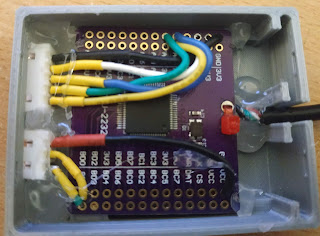ESP32 : FTDI 2232 HL + Gdb setup

FTDI 2232 I've redone the wiring of the FTDI so that it's a bit cleaner, with shorter wires The 3 pins connector is for serial. Why bother ? there is already one on the ESP32 ? Because each time you reset /stop the chip, the serial usb device disappears and you have to restart the serial console The one on the FTDI will stay present, so you won't loose the connection The pinout is on the left connector: ESP32 FTDI SIGNAL GND - GND GND 13 - AD0 TCK 12 - AD1 TDI 14 - AD3 TMS 15 - AD2 TDO and on the right connector ESP32 FTDI SIGNAL GND - GND RXD - BD0 TXD - BD1 GDB I played a bit with the normal gdb+openOcd setup, it does not work really well. On the over hand, PlatformIO works without a hitch, so the hardware is fine. After looking on the tubes, I ended up doing something a bit convoluted : Extract a .bin from the elf using esptool (arduino-cmake-stm32 in esp32 mode does that) Extract a .debug from the elf using


